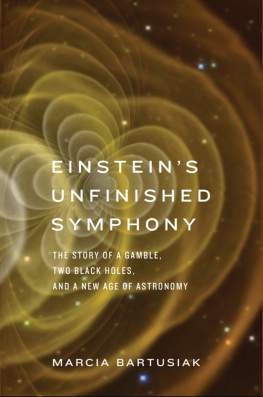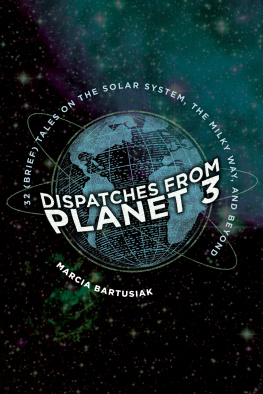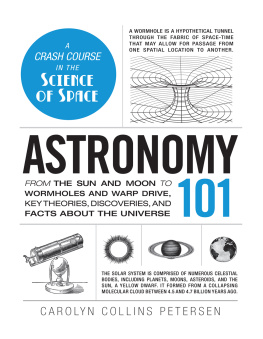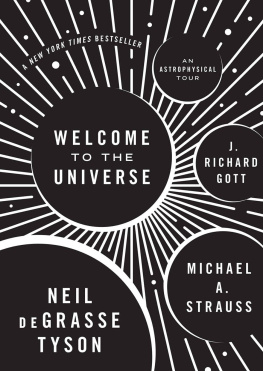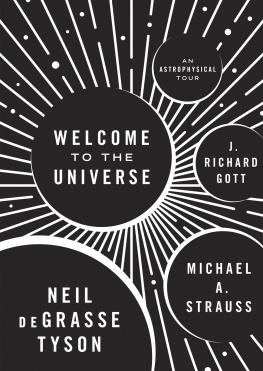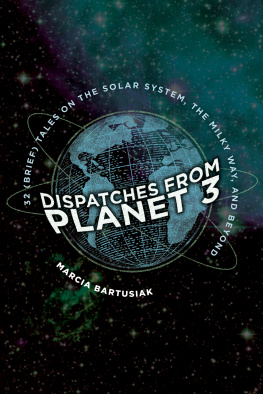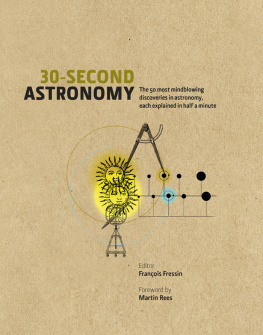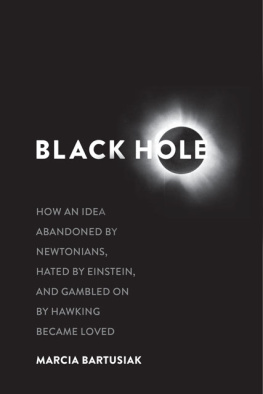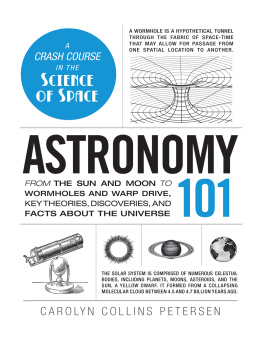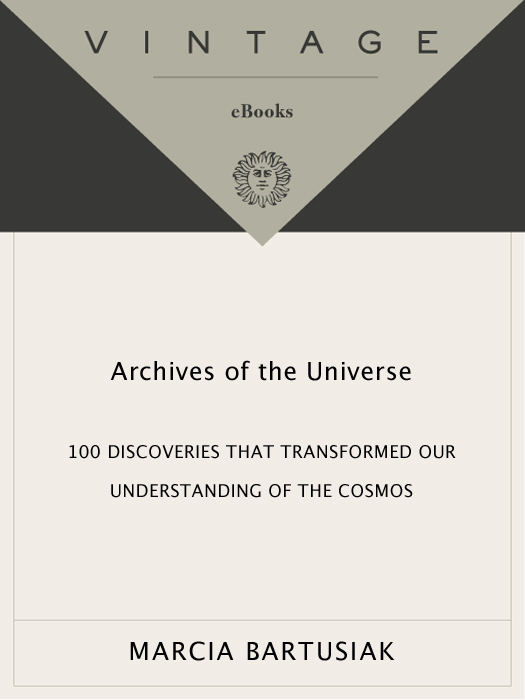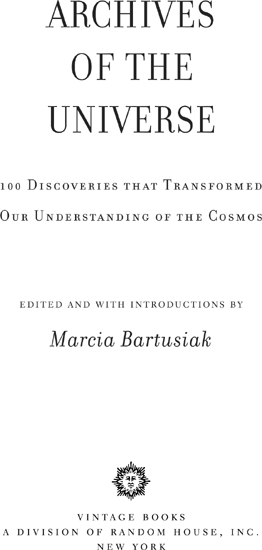Praise for Marcia Bartusiaks
ARCHIVES OF THE UNIVERSE
A coherent and compelling history.
Science News
Commendable . A book worth keeping on the shelf of scholar and layman alike . Bartusiak is a polymath who can communicate to the common reader. She shows us why each of her selected writers is great. This work is grand not only because it explains the distances of understanding traveled, but those yet to be discovered.
The Decatur Daily
Bartusiaks incisive commentaries and the wealth of well-chosen excerpts from primary sources tell this story with authority and grace. For those who feel awestruck upon gazing at the starry night sky, this book provides a compelling link to the seekers, both past and present, whose insights have cast light into the darkness.
Brian Greene, author of The Fabric of the Cosmos
Bartusiak has taken an all-star team of astronomers and evaluated, clarified and linked their original words in a manner that thrills the astronomically oriented reader. From the ancient Greeks to the modern celestial explorers we are treated to a World Series of scientific discovery.
Jay M. Pasachoff, author of A Field Guide to the Stars and Planets
[A] memorable guide to the stars . Bartusiaks ebullient prose and obvious enthusiasm make her anthology a unique and accessible tour of the history of astronomy.
Technology Review
A stunning compendium of scientific thought through the centuries with masterful introductions by Bartusiak. This is a treasure I will keep on my own shelf forever.
Alan Lightman, author of Einsteins Dreams
Impressive . Fascinating . Informative and enjoyable . Highly [recommended] for anyone with a keen interest in bettering his or her understanding of such a fundamentally important science and its contributions to human history . A must-read.
Science Books & Films
This book offers a unique chance to follow, with an expert guide, the key steps that have led to our current understanding of the cosmos. Marcia Bartusiak offers general readers a lucid commentary on a comprehensive and well-chosen anthology of scientific highlights.
Sir Martin Rees, author of Our Final Hour
Brings the most important works in the history of astronomy to life . If you want to know how our ideas about cosmology and black holes evolved, from Aristotles conceptions to the current conclusions about how we know that we are in an accelerating universe, this book is a wonderful place to begin.
The Key Reporter (Phi Beta Kappa)
Archives of the Universe takes the reader to the front lines of discoveryspinning the story of the evolution of the universe, and also the evolution of scientific styles . Marcia Bartusiak is the perfect guide to this series of seminal papers, giving us a library-in-a-book that belongs on every astronomy buffs bookshelf.
K. C. Cole, author of Mind Over Matter
Among the many famous authors presented hereGalileo, Einstein, Kepler, Newton, Copernicus, etc. no voice shines through as accessibly as that of Bartusiak herself . For serious astronomy enthusiasts, this book will surely become a well-loved resource.
Publishers Weekly
Bartusiak is a sprightly guide to astronomys greatest treasures . Her introductions transform this book from a shrewdly selected set of original documents into a delightful romp through the history of astronomy, right up to the twenty-first century.
Robert P. Kirshner, author of The Extravagant Universe

Marcia Bartusiak
ARCHIVES OF THE UNIVERSE
Marcia Bartusiak is the author of Thursdays Universe, Through a Universe Darkly, and Einsteins Unfinished Symphony. Her work has appeared in many magazines, including Astronomy, National Geographic, Discover, Science, and Smithsonian. A two-time winner of the American Institute of Physics Science Writing Award, she teaches in the graduate program in science writing at the Massachusetts Institute of Technology and lives in Sudbury, Massachusetts, with her husband.
www.marciabartusiak.com
ALSO BY MARCIA BARTUSIAK
Thursdays Universe
Through a Universe Darkly
A Positron Named Priscilla (coauthor)
Einsteins Unfinished Symphony
In memory of my father
Czeslaw A. Bartusiak
My first guide to the stars
Contents
Preface
I do not doubt that in the course of time this new science will be improved by further observations, and still more by true and conclusive proofs. But this need not diminish the glory of the first observer. My regard for the inventor of the harp is not made less by knowing that his instrument was very crudely constructed and still more crudely played. Rather, I admire him more than I do the hundreds of craftsmen who in ensuing centuries have brought this art to the highest perfection.
Galileo, writing in praise of William Gilbert, investigator of magnetism
O ften missing from astronomy textbooks are the voices of the scientists themselves. When Nicolaus Copernicus bravely placed the Sun at the center of the solar system in his noted De revolutionibus, he confesses, The scorn which I had to fear on account of the newness and absurdity of my opinion almost drove me to abandon a work already undertaken. Yet his friends convinced him to reconsider and announce to the world that the sun, as if resting on a kingly throne, governs the family of stars which wheel around. The Danish astronomer Tycho Brahe, upon seeing a brilliant new star (now known to be a supernova) in the heavens in 1572, wrote, I was so astonished at this sight that I was not ashamed to doubt the trustworthiness of my own eyes. Galileo informed the readers of his Sidereus nuncius that whatever region of the Milky Way to which you direct your spyglass, an immense number of stars immediately offer themselves to view, of which very many appear rather large and very conspicuous but the multitude of small ones is truly unfathomable. More recently when Margaret Geller, John Huchra, and Valrie de Lapparent in 1986 recognized that galaxies congregated to form a bubble like lattice through the universe, they playfully compared the distribution to suds in the kitchen sink.
This book was compiled and written to reacquaint us with these words of discovery. Within these pages are excerpts from the seminal reports that first introduced both scientists and the public to a wondrous variety of celestial phenomena and in the process moved our understanding of the cosmos forward. The arc of astronomys history and development over the centuries is traced through its key discovery papers, from the time of ancient Greece to the present day.
How does one define an astronomical discovery? It is essentially a new theory or cosmic feature that, once revealed, will have fundamental effects on how we view our place in the universe, and will lead to new and fruitful explorations. Pinpointing such a discovery can be an ever-evolving affair. The initial finding may be found over time to be faulty and incomplete, as further evidence accumulates and the original discovery is amended. But this does not alter its ultimate importance. Ptolemys influential model of an Earth-centered universe proved erroneous in the end, but it was a valuable tool nonetheless in making initial predictions concerning the motions of the planets. It was a necessary first step in a continuing journey of further testing and improvement. In the twentieth century the steady-state theory of the universe was a potent presence, galvanizing astronomers to seek and weigh observational evidence that ultimately confirmed the Big Bang model of the universes origin. And so these findings are included here. A full history of astronomys evolution is incomplete without including such material.


